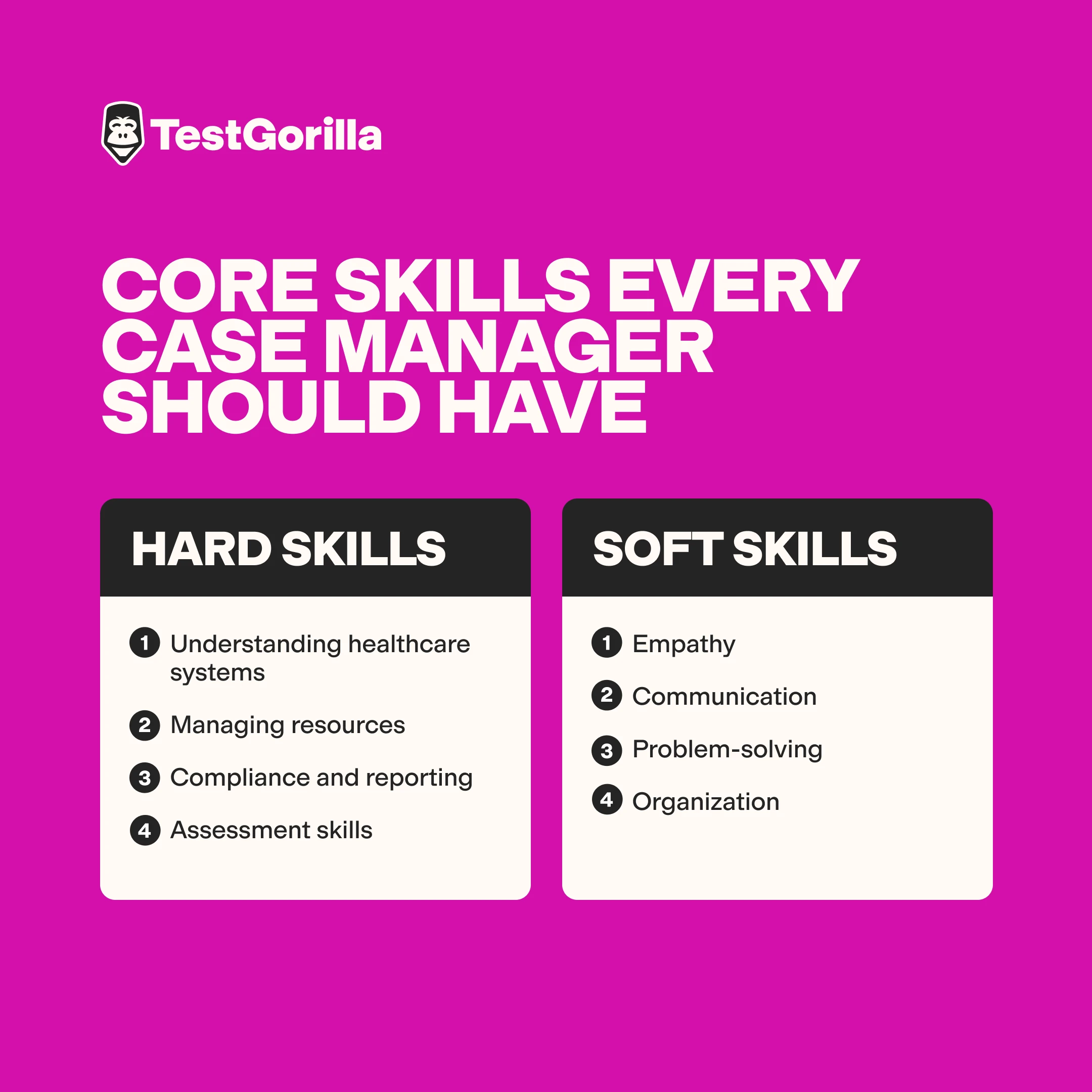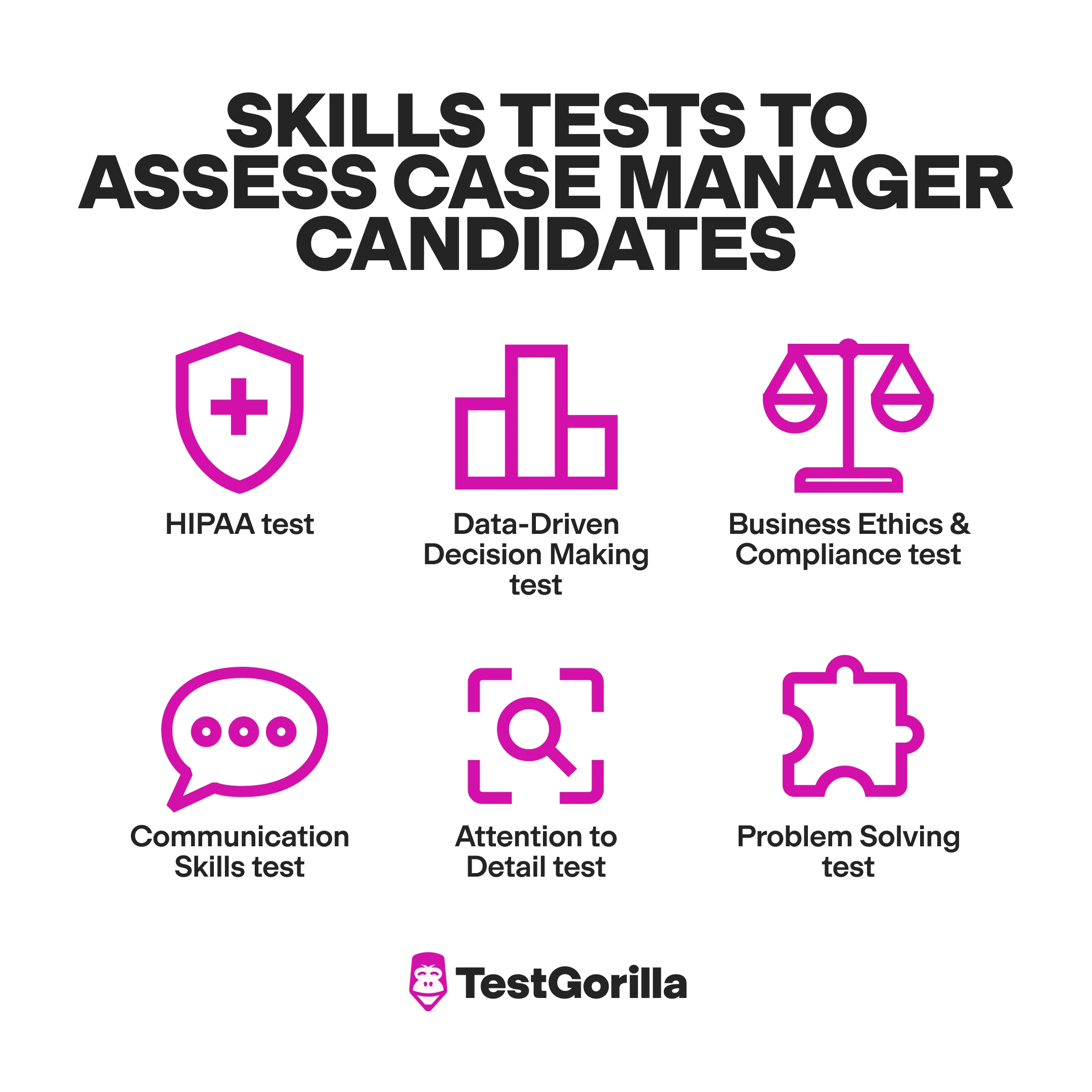Case managers really have their work cut out for them. They need to handle everything from understanding complex healthcare systems to helping people in tough situations – all while keeping detailed records and staying on top of regulations.
It's a lot, and making a bad hire can result in stressed-out clients and higher costs for employers.
But when case managers know what they're doing, everything runs more smoothly – from patient care to resource management. That's why we'll show you the top eight skills every case manager needs to succeed.
This article breaks down each skill, shows why it’s crucial, and helps you spot the best candidates for the job.
What is a case manager?
Simply put, a case manager is someone who organizes and manages care for people who need help with health issues or social services. They make sure each client gets the right help at the right time.
Day to day, a case manager wears many hats. They start by figuring out what kind of support a person needs, whether it's medical care, counseling, or help with housing. Then, they work out a plan to get these services lined up.
They keep tabs on how things are going, making sure the services are doing what they're supposed to. They also handle tons of paperwork and keep records to make sure everything's on track and meets the rules.
Depending on where they work, a case manager's job can shift quite a bit. Take insurance company case managers, for example. They're all about making sure people get the services they're covered for under their policies. Meanwhile, those in hospitals are more focused on navigating the healthcare maze, making sure patients smoothly transition through different levels of care.
Even though the basics of the job remain the same – like sorting out resources and options for clients – the nitty-gritty details can change. So, while good people skills, organization, and attention to detail are always key, case managers often need to get clued in on the specific quirks and resources of their workplace.
Still, they all benefit from having a set of essential skills.
Core skills every case manager must have
Here's a look at the key hard and soft skills they need to champion their clients.
Hard skills
Understanding healthcare systems: Case managers need to know how healthcare works so they can help clients navigate through their treatment options and services smoothly.
Managing resources: They must be smart about using available resources, like funding and community help, to get clients what they need without unnecessary delays or costs.
Compliance and reporting: Healthcare has a lot of rules. Case managers need to be good at keeping records and making sure everything they do meets legal and health standards.
Assessment skills: Case managers should be pros at figuring out what each client needs. This means they look at the whole picture – medical issues, mental health, and anything else going on in the client’s life. Getting this right is key to putting together a care plan that really works for the client.
Soft skills
Empathy: The job is often about connecting with people who are going through some of the toughest times of their lives. Case managers need to show real understanding to build trust with clients. This means listening carefully, acknowledging clients’ feelings, and responding thoughtfully to their concerns.
Communication: Case managers need to be clear and direct when they talk – not just with their clients but also with doctors and other service workers. They must make sure everyone's on the same page about what the client needs to line up the right support.
Problem-solving: Every client's situation is different and can have unexpected challenges. Case managers need to be quick on their feet with solutions that help their clients overcome barriers to care.
Organization: They handle lots of clients and paperwork at once, so being organized is key. This helps make sure no client is missed and everything runs smoothly.
The best insights on HR and recruitment, delivered to your inbox.
Biweekly updates. No spam. Unsubscribe any time.
How to assess case manager candidates
After you post your case manager job description and applications start coming in, you’ll need to assess them.
Resumes tell just part of the story – like a candidate’s background and education. They don't really show if someone's cut out to be a case manager. That’s where talent assessments come into play.
Using talent discovery platforms like TestGorilla, you can access various tests that cover technical skills, personality traits, and cognitive abilities. These tests give you a fuller picture of each candidate's potential.
This way, you can skip the drawn-out, bias-prone resume process and make your hiring decisions based on solid data.
The best part? You can combine up to five of our tests to create a unique assessment for your case manager role. Customize each test with your own questions, too!
Here’s what you can do to tailor your assessment for case manager candidates.
Start with hard skills
Kick things off with tests that are all about the practical skills for case management.
Our HIPAA test is great for evaluating healthcare case managers because it checks how well they know – and can stick to – patient privacy rules. It looks at things like understanding HIPAA's ins and outs, applying its rules, handling risks, and safeguarding patient information.
The Data-Driven Decision Making test measures how well a candidate can use data to make smart business choices. It’s a great way to see if a case manager can handle and make the most out of the resources they have for better patient outcomes.
Our Business Ethics & Compliance test
sees how well a candidate handles tricky ethical situations and sticks to the rules. It’s a solid way to pick out case managers who make good choices that put patient safety first, keep things honest, and meet the high standards of their job.
Check out their soft skills
Soft skills are just as important because case managers need to communicate well, empathize with clients, and solve problems efficiently.
Our Communication Skills test finds out if candidates can share information clearly and listen well. These abilities are key for working with clients and health providers.
The Attention to Detail test measures how well candidates can pay attention to details in textual information, check its consistency, and filter it properly. These are crucial skills for the mountains of paperwork case managers often work through.
Our Problem Solving test checks if candidates can understand and solve complex problems – like managing schedules, using logic for decision-making, and applying a given set of rules to situations.
You can also use personality tests to learn more about your case manager candidates’ work preferences, collaboration and communication styles, approaches to relationships, and more. You might use the Enneagram, 16 Personalities, or DISC tests to assess these things.
Don’t forget about your company culture
It's also important to pick someone who can bring something new to your team's culture – fresh ideas and perspectives.
Our Culture Add test helps you see how a candidate's values and behaviors might fit into your company’s and how they can make your existing culture better. This is especially important in case management, where having a team with diverse perspectives can improve the quality of care and understanding.
Wrap up with behavioral interviews
Go even deeper with interviews that ask about past behaviors to see how your case manager candidates deal with real-life situations.
You could ask things like:
"Can you walk me through a time when you had to put together a complex care plan for a client? What steps did you take, and what was the outcome?" This sheds light on their planning and assessment skills.
"Tell me about a time you had to handle a tough conversation with a healthcare provider. What did you do, and what was the result?" This can tell you a lot about their communication and problem-solving skills.
You can also use these questions to cover bases your tests may have missed. For instance, you might ask them to describe situations where they had to demonstrate empathy if none of your skills tests covered empathy.
For more helpful interview questions, check out these 36 behavioral interview questions for managers.
2 mistakes to avoid when assessing candidates
Beware of these common pitfalls when evaluating your case manager candidates.
1. Downplaying advocacy skills
Just focusing on a candidate’s technical skills ignores the fact that good case managers often need to find ways to stick up for their clients. This is especially true in challenging bureaucratic circles with lots of red tape.
During the interview, ask candidates to share stories about times they went the extra mile to get clients the resources or support they needed. This will help you find case managers who aren’t just caring but who also take action and know how to make things happen for their clients.
2. Overlooking adaptability and stress management
Case managers often deal with lots of surprises and stressful situations. If you don't check how well candidates handle sudden changes or stress, you might end up hiring someone who struggles when things get tough.
A good way to see if they're up to the challenge is to ask them about times they've had to deal with big changes or really stressful moments. This helps make sure you pick someone who can stay cool, no matter what comes their way in this role.
FAQ
Let’s tackle some common questions about case managers.
What should a case manager do first?
When starting with a new client, a case manager should first conduct a thorough assessment to understand the client’s needs, challenges, and resources. This involves chatting with the client to get a clear picture of what they need help with and setting goals together. Based on this, the case manager then creates a personalized plan to address those needs.
What is the base salary for a case manager?
The pay for case managers in the US can vary quite a bit, depending on where they work, their experience, and what kind of organization they're with. According to Glassdoor, their yearly salary ranges as of 2024 from around $30,000 to over $100,000. On average, you might see salaries anywhere from about $43,000 to $94,000 a year.
Spot your next case manager with TestGorilla
Case managers are bridges over troubled water for their clients. They need to have a sturdy foundation of technical skills – like knowing the ins and outs of the healthcare system. But they must also be flexible and patient with the clients they serve.
Without making sure your candidates have all the necessary hard and soft skills, you can end up with case managers who are great with details but lack empathy – or are ready to fight for their clients but struggle with compliance.
That’s why having a thorough, science-backed assessment process is key to your hiring success. Resumes aren’t enough. With TestGorilla, you can pick from various tests to assess case managers’ technical skills, personality traits, and cognitive abilities.
Check it out yourself. Explore our library of 350+ tests, sign up for a live demo, or make a free TestGorilla account today!
You've scrolled this far
Why not try TestGorilla for free, and see what happens when you put skills first.




















